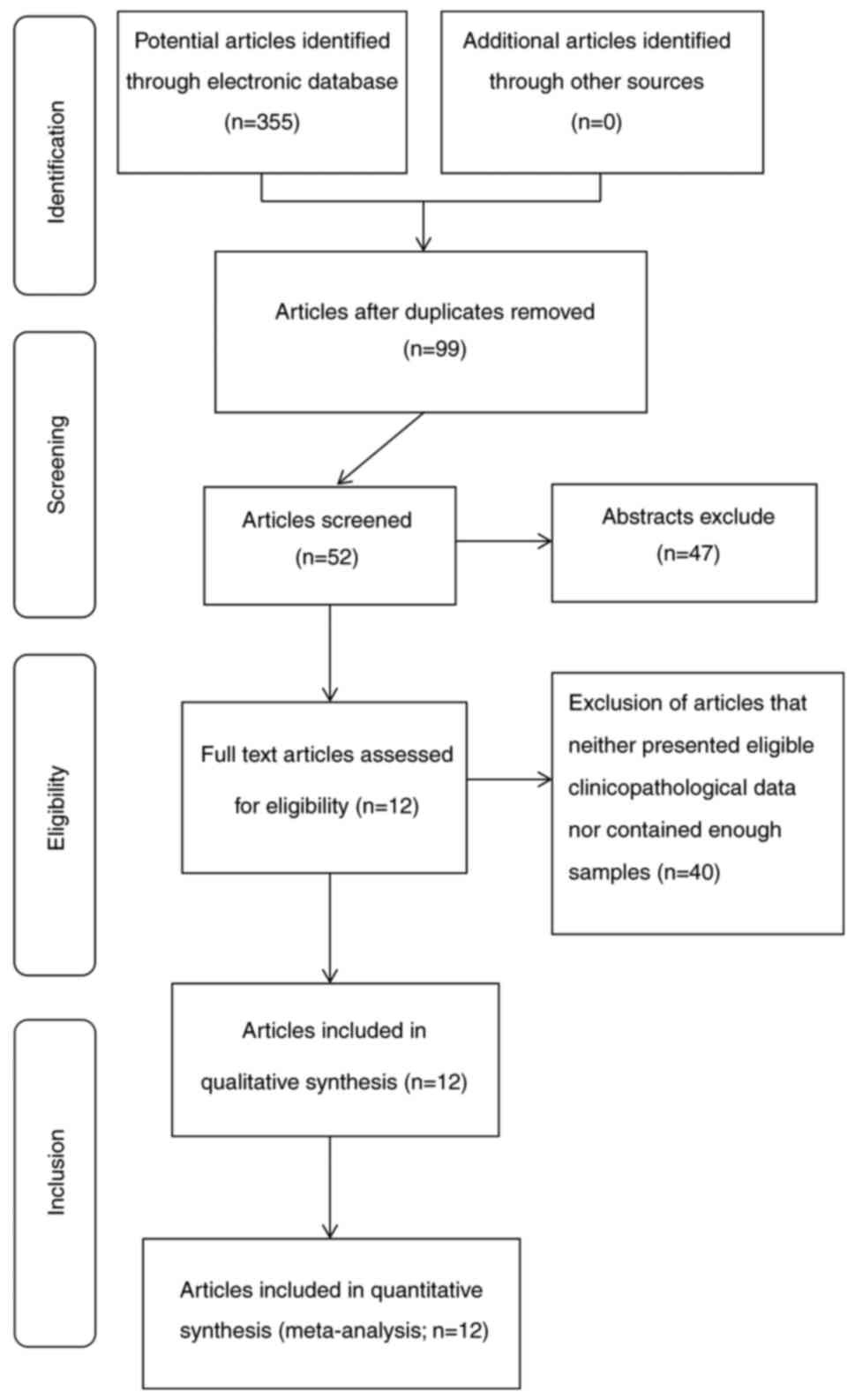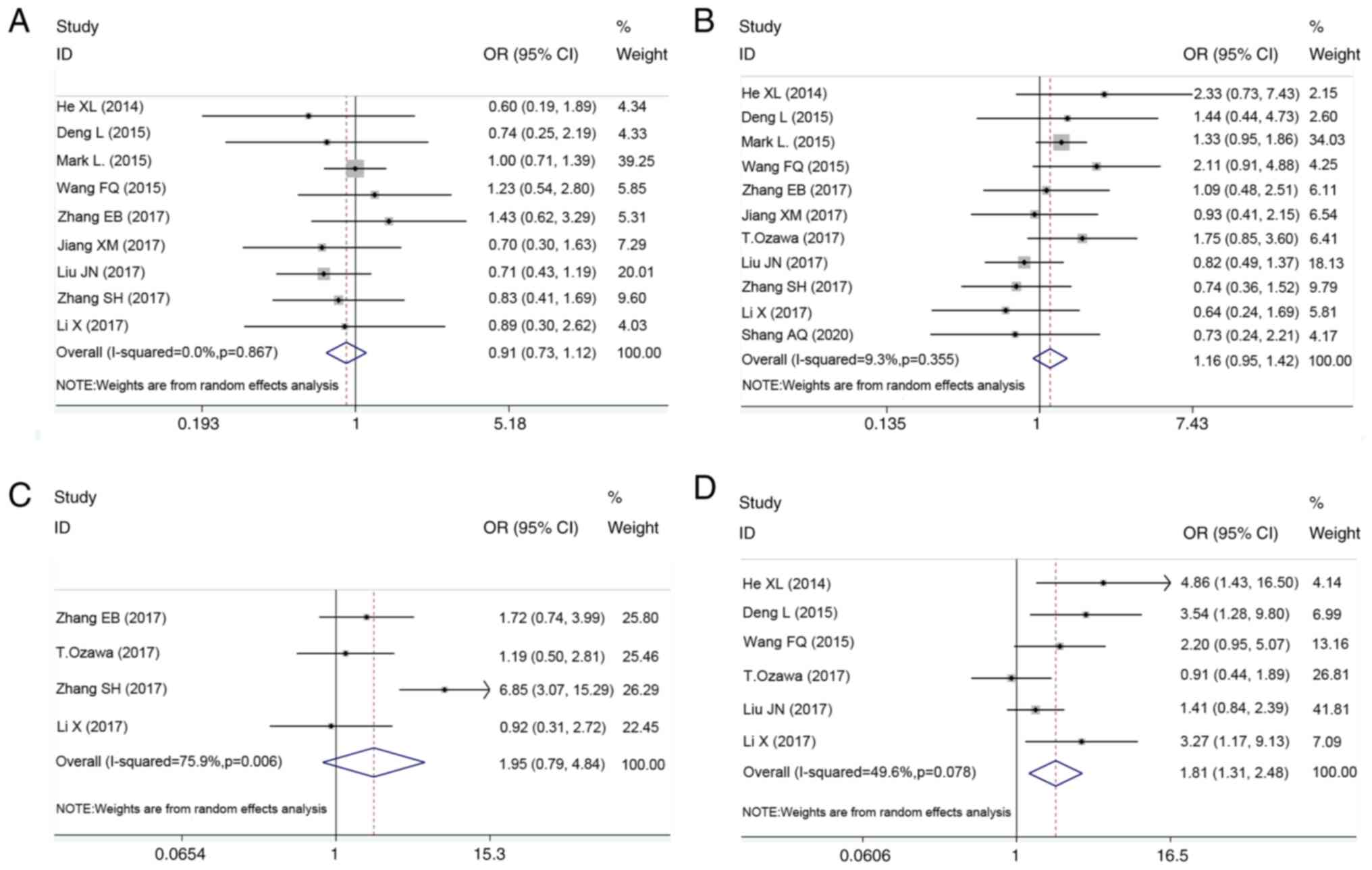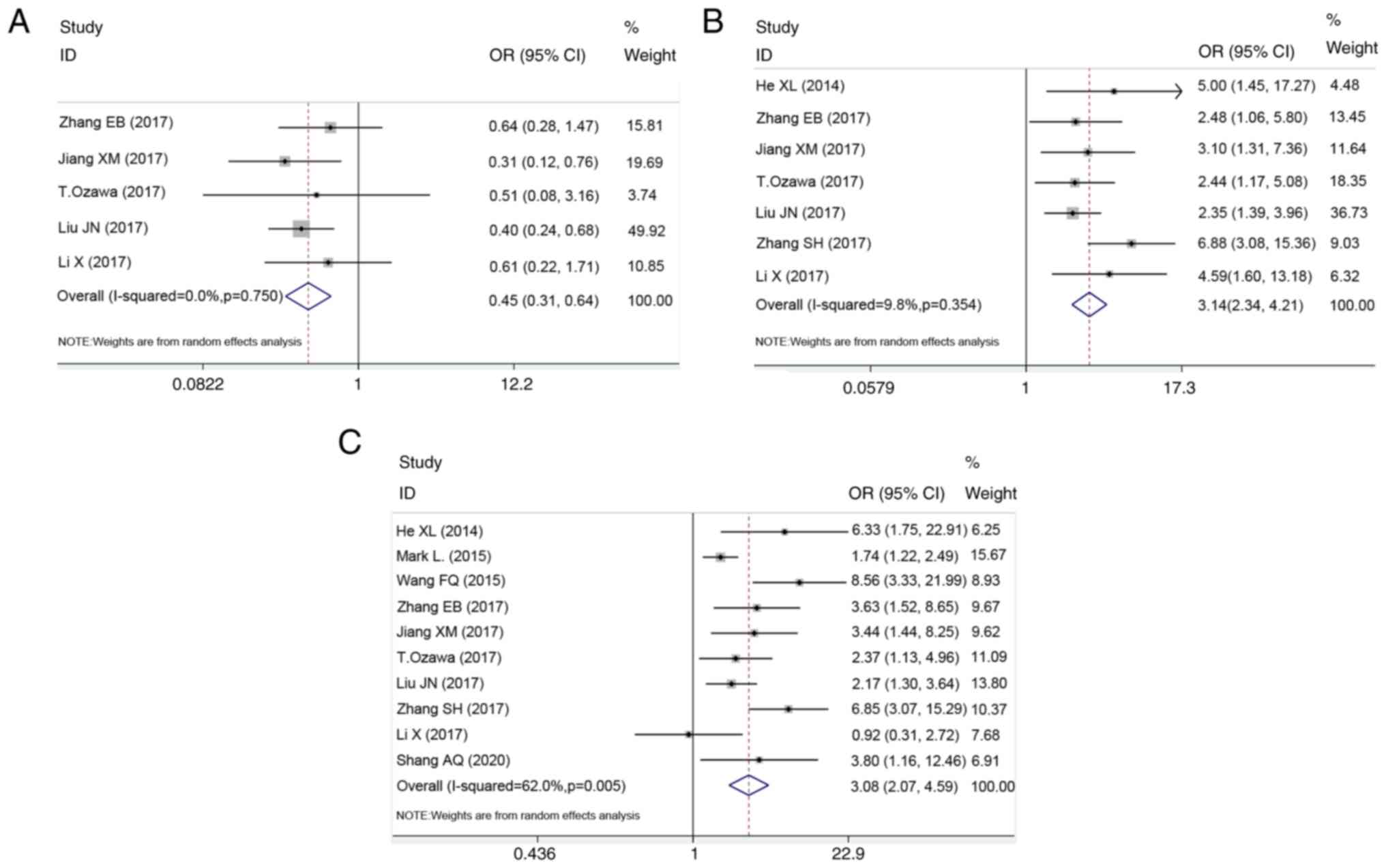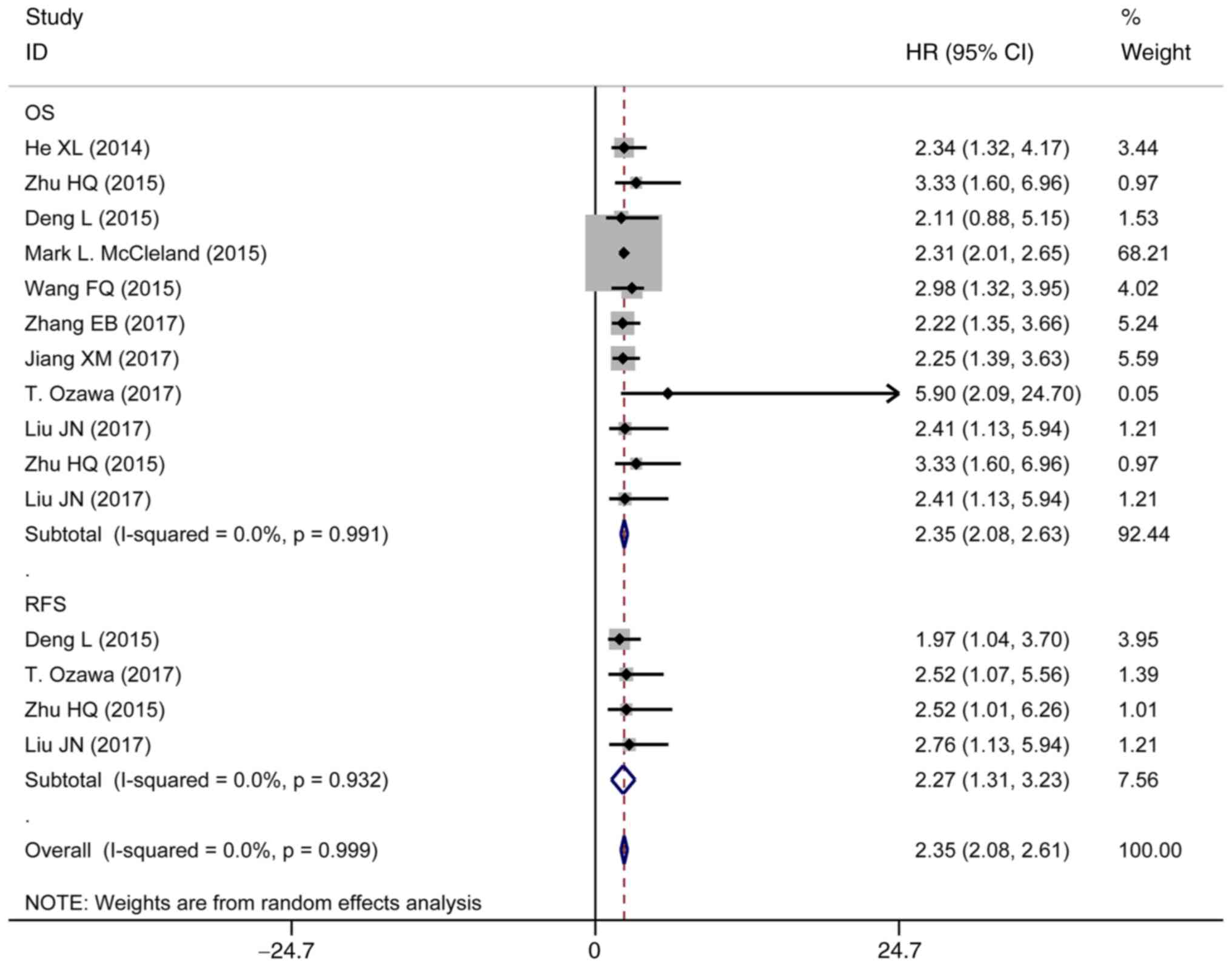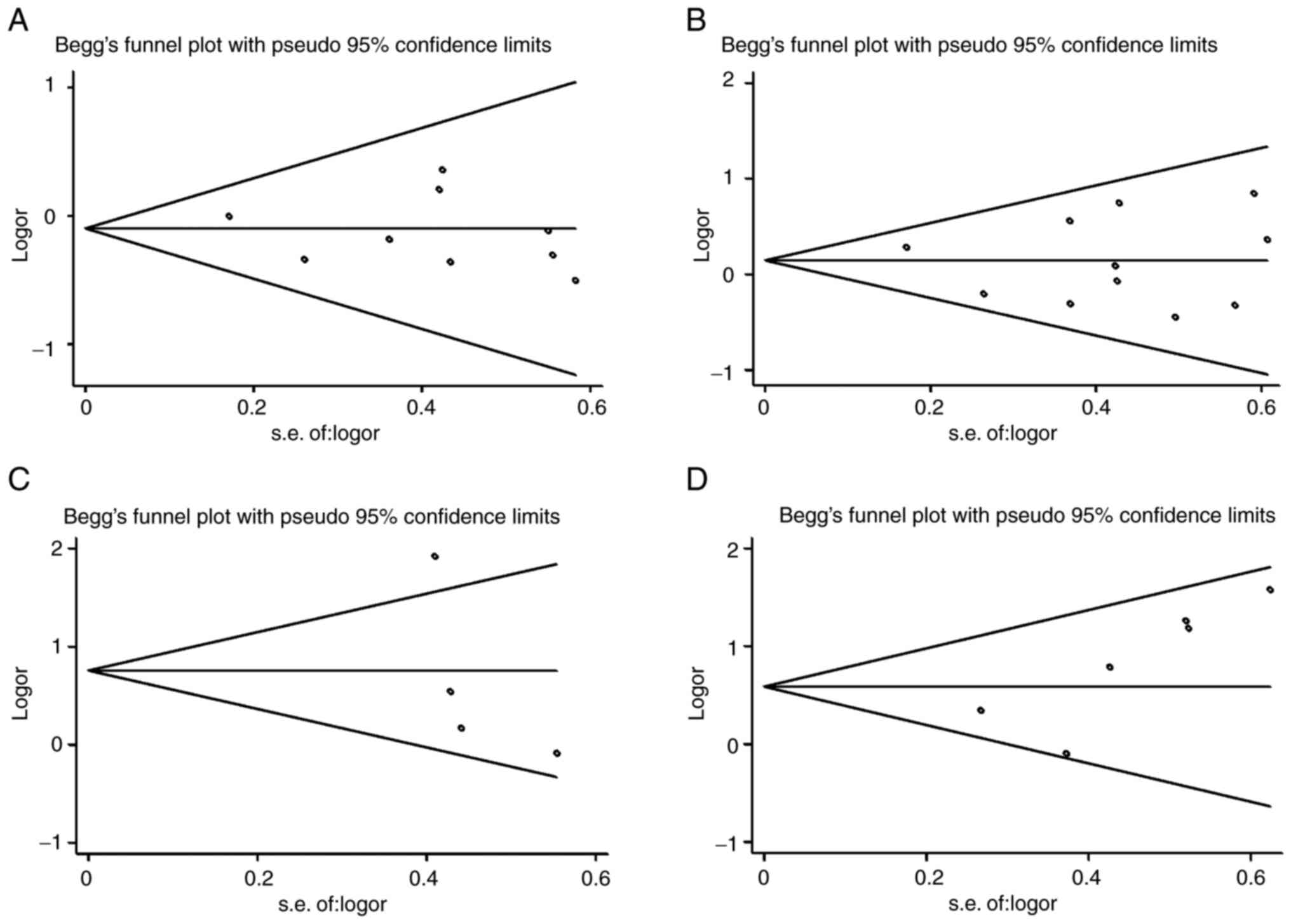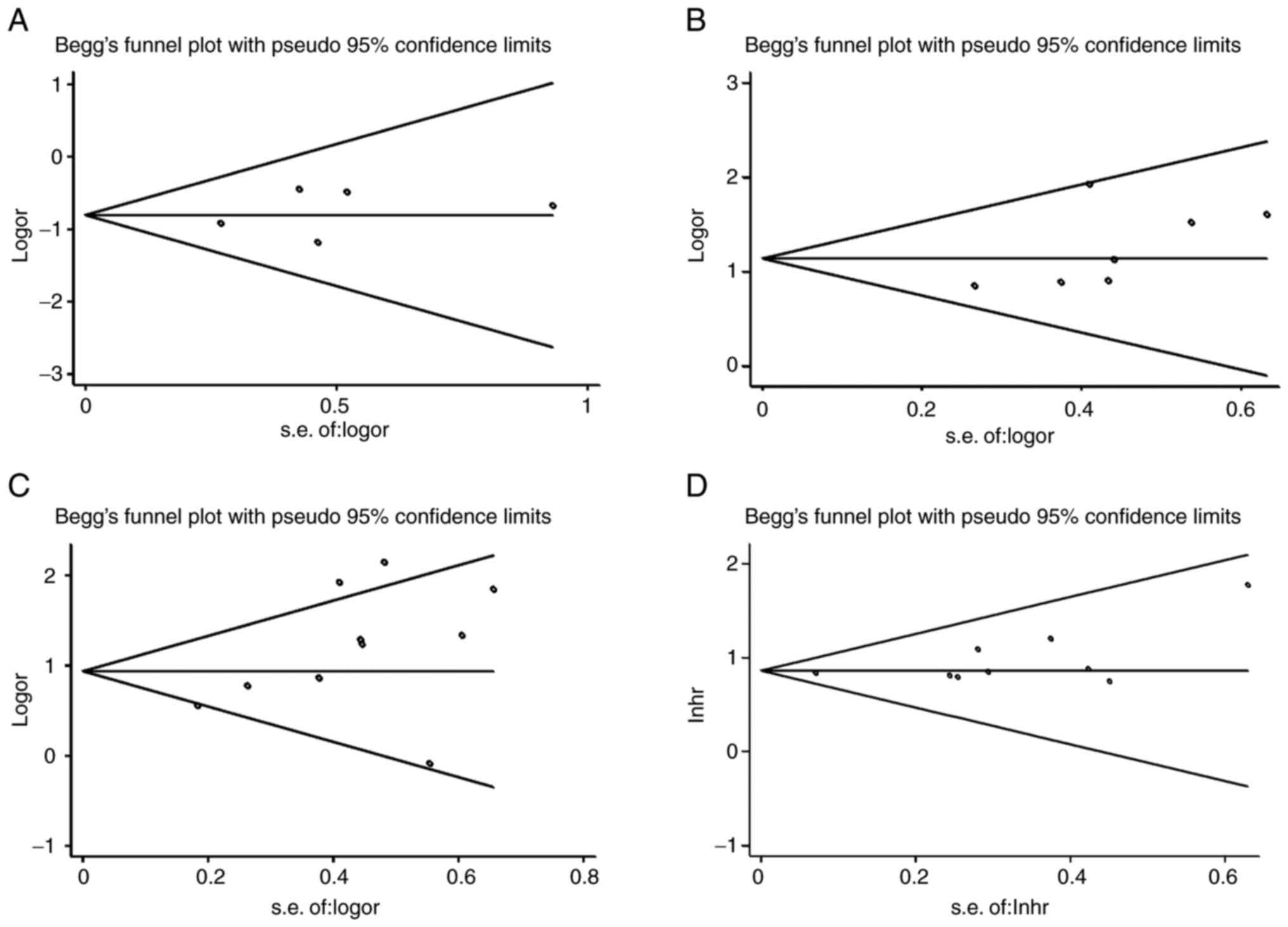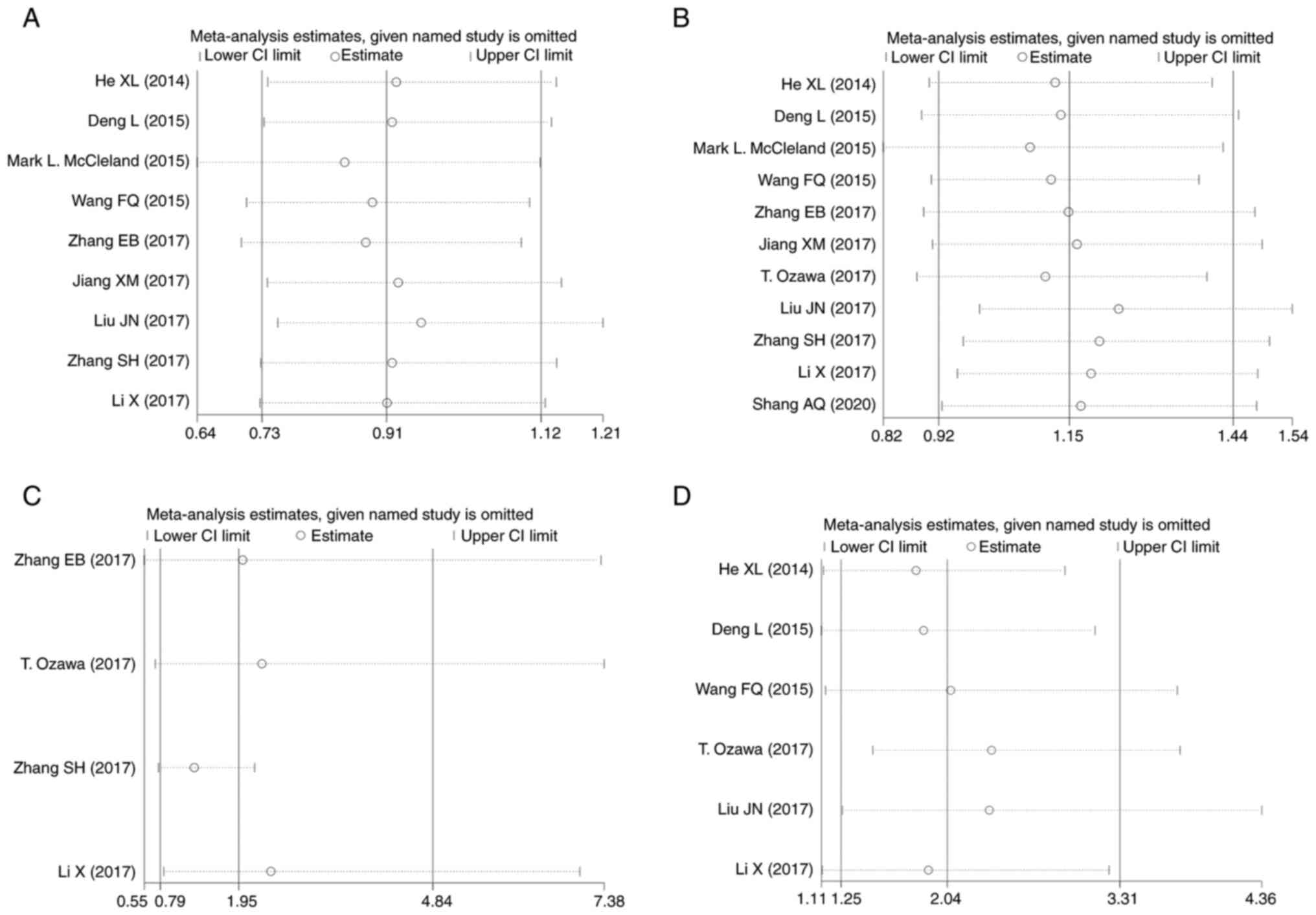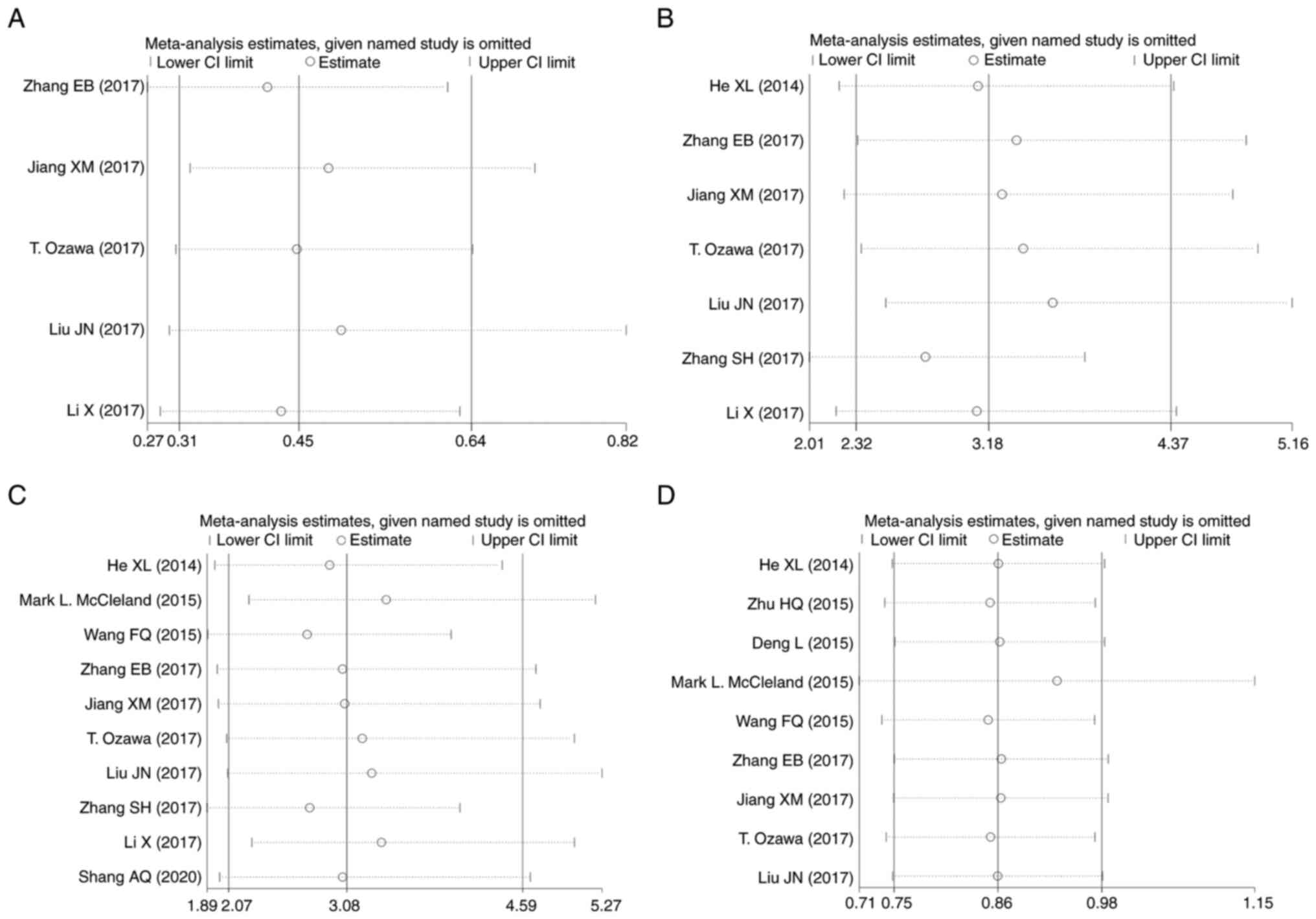|
1
|
Hu J, Ni G, Mao L, Xue X, Zhang J, Wu W,
Zhang S, Zhao H, Ding L and Wang L: LINC00565 promotes
proliferation and inhibits apoptosis of gastric cancer by targeting
miR-665/AKT3 axis. Onco Targets Ther. 12:7865–7875. 2019.
View Article : Google Scholar : PubMed/NCBI
|
|
2
|
Sung H, Ferlay J, Siegel RL, Laversanne M,
Soerjomataram I, Jemal A and Bray F: Global cancer statistics 2020:
GLOBOCAN estimates of incidence and mortality worldwide for 36
cancers in 185 countries. CA Cancer J Clin. 71:209–249. 2021.
View Article : Google Scholar : PubMed/NCBI
|
|
3
|
Jiang J, Ma T, Xi W, Yang C, Wu J, Zhou C,
Wang N, Zhu Z and Zhang J: Pre-treatment inflammatory biomarkers
predict early treatment response and favorable survival in patients
with metastatic colorectal cancer who underwent first line
cetuximab plus chemotherapy. Cancer Manag Res. 11:8657–8668. 2019.
View Article : Google Scholar : PubMed/NCBI
|
|
4
|
Fiorillo C, Quero G and Alfieri S:
Resection margin status in pancreatic cancer surgery: Is it really
less important than the N status? Br J Surg. 106:15592019.
View Article : Google Scholar : PubMed/NCBI
|
|
5
|
Ayoub WS, Steggerda J, Yang JD, Kuo A,
Sundaram V and Lu SC: Current status of hepatocellular carcinoma
detection: Screening strategies and novel biomarkers. Ther Adv Med
Oncol. 11:17588359198691202019. View Article : Google Scholar : PubMed/NCBI
|
|
6
|
Salati M, Orsi G, Smyth E, Aprile G,
Beretta G, De Vita F, Di Bartolomeo M, Fanotto V, Lonardi S, Morano
F, et al: Gastric cancer: Translating novels concepts into clinical
practice. Cancer Treat Rev. 79:1018892019. View Article : Google Scholar : PubMed/NCBI
|
|
7
|
Serra O, Galán M, Ginesta MM, Calvo M,
Sala N and Salazar R: Comparison and applicability of molecular
classifications for gastric cancer. Cancer Treat Rev. 77:29–34.
2019. View Article : Google Scholar : PubMed/NCBI
|
|
8
|
Necula L, Matei L, Dragu D, Neagu AI,
Mambet C, Nedeianu S, Bleotu C, Diaconu CC and Chivu-Economescu M:
Recent advances in gastric cancer early diagnosis. World J
Gastroenterol. 25:2029–2044. 2019. View Article : Google Scholar : PubMed/NCBI
|
|
9
|
López-Urrutia E, Bustamante Montes LP,
Ladrón de Guevara Cervantes D, Pérez-Plasencia C and Campos-Parra
AD: Crosstalk between long non-coding RNAs, Micro-RNAs and mRNAs:
Deciphering molecular mechanisms of master regulators in cancer.
Front Oncol. 9:6692019. View Article : Google Scholar : PubMed/NCBI
|
|
10
|
Shang W, Adzika GK, Li Y, Huang Q, Ding N,
Chinembiri B, Rashid MS and Machuki JO: Molecular mechanisms of
circular RNAs, transforming growth factor-β, and long noncoding
RNAs in hepatocellular carcinoma. Cancer Med. 8:6684–6699. 2019.
View Article : Google Scholar : PubMed/NCBI
|
|
11
|
Li MY, Tang XH, Fu Y, Wang TJ and Zhu JM:
Regulatory mechanisms and clinical applications of the long
non-coding RNA PVT1 in cancer treatment. Front Oncol. 9:7872019.
View Article : Google Scholar : PubMed/NCBI
|
|
12
|
Chi Y, Wang D, Wang J, Yu W and Yang J:
Long non-coding RNA in the pathogenesis of cancers. Cells.
8:10152019. View Article : Google Scholar : PubMed/NCBI
|
|
13
|
Li C, Zheng H, Hou W, Bao H, Xiong J, Che
W, Gu Y, Sun H and Liang P: Long non-coding RNA linc00645 promotes
TGF-β-induced epithelial-mesenchymal transition by regulating
miR-205-3p-ZEB1 axis in glioma. Cell Death Dis. 10:7172019.
View Article : Google Scholar : PubMed/NCBI
|
|
14
|
Song Z, Zhang X, Lin Y, Wei Y, Liang S and
Dong C: LINC01133 inhibits breast cancer invasion and metastasis by
negatively regulating SOX4 expression through EZH2. J Cell Mol Med.
23:7554–7565. 2019. View Article : Google Scholar : PubMed/NCBI
|
|
15
|
Wang J, Zhou J, Jiang C, Zheng J, Namba H,
Chi P and Asakawa T: LNRRIL6, a novel long noncoding RNA, protects
colorectal cancer cells by activating the IL-6-STAT3 pathway. Mol
Oncol. 13:2344–2360. 2019. View Article : Google Scholar : PubMed/NCBI
|
|
16
|
Li W, Li N, Shi K and Chen Q: Systematic
review and meta-analysis of the utility of long non-coding RNA GAS5
as a diagnostic and prognostic cancer biomarker. Oncotarget.
8:66414–66425. 2017. View Article : Google Scholar : PubMed/NCBI
|
|
17
|
Nissan A, Stojadinovic A,
Mitrani-Rosenbaum S, Halle D, Grinbaum R, Roistacher M, Bochem A,
Dayanc BE, Ritter G, Gomceli I, et al: Colon cancer associated
transcript-1: A novel RNA expressed in malignant and pre-malignant
human tissues. Int J Cancer. 130:1598–1606. 2012. View Article : Google Scholar : PubMed/NCBI
|
|
18
|
Ghafouri-Fard S and Taheri M: Colon
cancer-associated transcripts 1 and 2: Roles and functions in human
cancers. J Cell Physiol. Jan 28–2019.(Epub ahead of print).
View Article : Google Scholar
|
|
19
|
Guo X and Hua Y: CCAT1: An oncogenic long
noncoding RNA in human cancers. J Cancer Res Clin Oncol.
143:555–562. 2017. View Article : Google Scholar : PubMed/NCBI
|
|
20
|
Zhang C, Wang W, Lin J, Xiao J and Tian Y:
lncRNA CCAT1 promotes bladder cancer cell proliferation, migration
and invasion. Int Braz J Urol. 45:549–559. 2019. View Article : Google Scholar : PubMed/NCBI
|
|
21
|
You Z, Liu C, Wang C, Ling Z, Wang Y, Wang
Y, Zhang M, Chen S, Xu B, Guan H and Chen M: LncRNA CCAT1 promotes
prostate cancer cell proliferation by interacting with DDX5 and
MIR-28-5P. Mol Cancer Ther. 18:2469–2479. 2019. View Article : Google Scholar : PubMed/NCBI
|
|
22
|
Shen H, Wang L, Xiong J, Ren C, Gao C,
Ding W, Zhu D, Ma D and Wang H: Long non-coding RNA CCAT1 promotes
cervical cancer cell proliferation and invasion by regulating the
miR-181a-5p/MMP14 axis. Cell Cycle. 18:1110–1121. 2019. View Article : Google Scholar : PubMed/NCBI
|
|
23
|
Han C, Li X, Fan Q, Liu G and Yin J: CCAT1
promotes triple-negative breast cancer progression by suppressing
miR-218/ZFX signaling. Aging (Albany NY). 11:4858–4875. 2019.
View Article : Google Scholar : PubMed/NCBI
|
|
24
|
Wang N, Yu Y, Xu B, Zhang M, Li Q and Miao
L: Pivotal prognostic and diagnostic role of the long non-coding
RNA colon cancer-associated transcript 1 expression in human cancer
(review). Mol Med Rep. 19:771–782. 2019.PubMed/NCBI
|
|
25
|
Moher D, Liberati A, Tetzlaff J and Altman
DG; PRISMA Group, : Preferred reporting items for systematic
reviews and meta-analyses: The PRISMA statement. J Clin Epidemiol.
62:1006–1012. 2009. View Article : Google Scholar : PubMed/NCBI
|
|
26
|
Seitz AK, Christensen LL, Christensen E,
Faarkrog K, Ostenfeld MS, Hedegaard J, Nordentoft I, Nielsen MM,
Palmfeldt J, Thomson M, et al: Profiling of long non-coding RNAs
identifies LINC00958 and LINC01296 as candidate oncogenes in
bladder cancer. Sci Rep. 7:3952017. View Article : Google Scholar : PubMed/NCBI
|
|
27
|
Weiser MR: AJCC 8th edition: Colorectal
cancer. Ann Surg Oncol. 25:1454–1455. 2018. View Article : Google Scholar : PubMed/NCBI
|
|
28
|
Chun YS, Pawlik TM and Vauthey JN: 8th
Edition of the AJCC cancer staging manual: Pancreas and
hepatobiliary cancers. Ann Surg Oncol. 25:845–847. 2018. View Article : Google Scholar : PubMed/NCBI
|
|
29
|
Tsoukalas N, Tsapakidis K and Kamposioras
K: AJCC-8 TNM staging system for gastric cancer. Is there a scope
for improvement? J Invest Surg. 33:939–940. 2020. View Article : Google Scholar : PubMed/NCBI
|
|
30
|
He X, Tan X, Wang X, Jin H, Liu L, Ma L,
Yu H and Fan Z: C-Myc-activated long noncoding RNA CCAT1 promotes
colon cancer cell proliferation and invasion. Tumour Biol.
35:12181–12188. 2014. View Article : Google Scholar : PubMed/NCBI
|
|
31
|
Zhu HQ, Zhou X, Chang H, Li HG, Liu FF, Ma
CQ and Lu J: Aberrant expression of CCAT1 regulated by c-Myc
predicts the prognosis of hepatocellular carcinoma. Asian Pac J
Cancer Prev. 16:5181–5185. 2015. View Article : Google Scholar : PubMed/NCBI
|
|
32
|
Liu JN and Shangguan YM: Long non-coding
RNA CARLo-5 upregulation associates with poor prognosis in patients
suffering gastric cancer. Eur Rev Med Pharmacol Sci. 21:530–534.
2017. View Article : Google Scholar : PubMed/NCBI
|
|
33
|
Deng L, Yang SB, Xu FF and Zhang JH: Long
noncoding RNA CCAT1 promotes hepatocellular carcinoma progression
by functioning as let-7 sponge. J Exp Clin Cancer Res. 34:182015.
View Article : Google Scholar : PubMed/NCBI
|
|
34
|
Jiang XM, Li ZL, Li JL, Zheng WY, Li XH,
Cui YF and Sun DJ: LncRNA CCAT1 as the unfavorable prognostic
biomarker for cholangiocarcinoma. Eur Rev Med Pharmacol Sci.
21:1242–1247. 2017.PubMed/NCBI
|
|
35
|
Ozawa T, Matsuyama T, Toiyama Y, Takahashi
N, Ishikawa T, Uetake H, Yamada Y, Kusunoki M, Calin G and Goel A:
CCAT1 and CCAT2 long noncoding RNAs, located within the 8q.24.21
‘gene desert’, serve as important prognostic biomarkers in
colorectal cancer. Ann Oncol. 28:1882–1888. 2017. View Article : Google Scholar : PubMed/NCBI
|
|
36
|
Wang F, Xie C, Zhao W, Deng Z, Yang H and
Fang Q: Long non-coding RNA CARLo-5 expression is associated with
disease progression and predicts outcome in hepatocellular
carcinoma patients. Clin Exp Med. 17:33–43. 2017. View Article : Google Scholar : PubMed/NCBI
|
|
37
|
McCleland ML, Mesh K, Lorenzana E, Chopra
VS, Segal E, Watanabe C, Haley B, Mayba O, Yaylaoglu M, Gnad F and
Firestein R: CCAT1 is an enhancer-templated RNA that predicts BET
sensitivity in colorectal cancer. J Clin Invest. 126:639–652. 2016.
View Article : Google Scholar : PubMed/NCBI
|
|
38
|
Zhang E, Han L, Yin D, He X, Hong L, Si X,
Qiu M, Xu T, De W, Xu L, et al: H3K27 acetylation activated-long
non-coding RNA CCAT1 affects cell proliferation and migration by
regulating SPRY4 and HOXB13 expression in esophageal squamous cell
carcinoma. Nucleic Acids Res. 45:3086–3101. 2017. View Article : Google Scholar : PubMed/NCBI
|
|
39
|
Zhang S, Xiao J, Chai Y, Du YY, Liu Z,
Huang K, Zhou X and Zhou W: LncRNA-CCAT1 promotes migration,
invasion, and EMT in intrahepatic cholangiocarcinoma through
suppressing miR-152. Dig Dis Sci. 62:3050–3058. 2017. View Article : Google Scholar : PubMed/NCBI
|
|
40
|
Li X, Zhou Y and Qian H: CCAT1 expressed
in malignant and pre-malignant human gastric tissues. Cell Mol Biol
(Noisy-le-grand). 63:89–93. 2017. View Article : Google Scholar : PubMed/NCBI
|
|
41
|
Shang A, Wang W, Gu C, Chen W, Lu W, Sun Z
and Li D: Long non-coding RNA CCAT1 promotes colorectal cancer
progression by regulating miR-181a-5p expression. Aging (Albany
NY). 12:8301–8320. 2020. View Article : Google Scholar : PubMed/NCBI
|
|
42
|
Guglielmi S, D'Angelo F, Bichard P,
Lepilliez V and Frossard JL: Gastric intestinal metaplasia and
cancer risk: How to follow? Rev Med Suisse. 15:1502–1505. 2019.(In
French). PubMed/NCBI
|
|
43
|
Song Y, Yang H, Lin R, Jiang K and Wang
BM: The role of ferroptosis in digestive system cancer. Oncol Lett.
18:2159–2164. 2019.PubMed/NCBI
|
|
44
|
Song Y, Ye M, Zhou J, Wang Z and Zhu X:
Targeting E-cadherin expression with small molecules for digestive
cancer treatment. Am J Transl Res. 11:3932–3944. 2019.PubMed/NCBI
|
|
45
|
Montalvo-Jave EE, Rahnemai-Azar AA,
Papaconstantinou D, Deloiza ME, Tsilimigras DI, Moris D,
Mendoza-Barrera GE, Weber SM and Pawlik TM: Molecular pathways and
potential biomarkers in gallbladder cancer: A comprehensive review.
Surg Oncol. 31:83–89. 2019. View Article : Google Scholar : PubMed/NCBI
|
|
46
|
Ramnarine VR, Kobelev M, Gibb EA, Nouri M,
Lin D, Wang Y, Buttyan R, Davicioni E, Zoubeidi A and Collins CC:
The evolution of long noncoding RNA acceptance in prostate cancer
initiation, progression, and its clinical utility in disease
management. Eur Urol. 76:546–559. 2019. View Article : Google Scholar : PubMed/NCBI
|
|
47
|
Zhou DD, Liu XF, Lu CW, Pant OP and Liu
XD: Long non-coding RNA PVT1: Emerging biomarker in digestive
system cancer. Cell Prolif. 50:e123982017. View Article : Google Scholar : PubMed/NCBI
|
|
48
|
Guo J, Ma Y, Peng X, Jin H and Liu J:
LncRNA CCAT1 promotes autophagy via regulating ATG7 by sponging
miR-181 in hepatocellular carcinoma. J Cell Biochem.
120:17975–17983. 2019. View Article : Google Scholar : PubMed/NCBI
|
|
49
|
Abedini P, Fattahi A, Agah S, Talebi A,
Beygi AH, Amini SM, Mirzaei A and Akbari A: Expression analysis of
circulating plasma long noncoding RNAs in colorectal cancer: The
relevance of lncRNAs ATB and CCAT1 as potential clinical hallmarks.
J Cell Physiol. 234:22028–22033. 2019. View Article : Google Scholar : PubMed/NCBI
|
|
50
|
Yang C, Pan Y and Deng SP: Downregulation
of lncRNA CCAT1 enhances 5-fluorouracil sensitivity in human colon
cancer cells. BMC Mol Cell Biol. 20:92019. View Article : Google Scholar : PubMed/NCBI
|
|
51
|
Zhang J, Cai M, Jiang D and Xu L:
Upregulated LncRNA-CCAT1 promotes hepatocellular carcinoma
progression by functioning as miR-30c-2-3p sponge. Cell Biochem
Funct. 37:84–92. 2019. View Article : Google Scholar : PubMed/NCBI
|
|
52
|
Fang H, Liu HM, Wu WH, Liu H, Pan Y and Li
WJ: Upregulation of long noncoding RNA CCAT1-L promotes
epithelial-mesenchymal transition in gastric adenocarcinoma. Onco
Targets Ther. 11:5647–5655. 2018. View Article : Google Scholar : PubMed/NCBI
|
|
53
|
Li N, Jiang K, Fang LP, Yao LL and Yu Z:
Knockdown of long noncoding RNA CCAT1 inhibits cell growth,
invasion and peritoneal metastasis via downregulation of Bmi-1 in
gastric cancer. Neoplasma. 65:736–744. 2018. View Article : Google Scholar : PubMed/NCBI
|
|
54
|
Hu M, Zhang Q, Tian XH, Wang JL, Niu YX
and Li G: lncRNA CCAT1 is a biomarker for the proliferation and
drug resistance of esophageal cancer via the miR-143/PLK1/BUBR1
axis. Mol Carcinog. 58:2207–2217. 2019. View Article : Google Scholar : PubMed/NCBI
|
|
55
|
Shi D, Wu F, Gao F, Qing X and Shao Z:
Prognostic value of long non-coding RNA CCAT1 expression in
patients with cancer: A meta-analysis. PLoS One. 12:e01793462017.
View Article : Google Scholar : PubMed/NCBI
|
|
56
|
Cao W, Chen HD, Yu YW, Li N and Chen WQ:
Changing profiles of cancer burden worldwide and in China: A
secondary analysis of the global cancer statistics 2020. Chin Med J
(Engl). 134:783–791. 2021. View Article : Google Scholar : PubMed/NCBI
|















